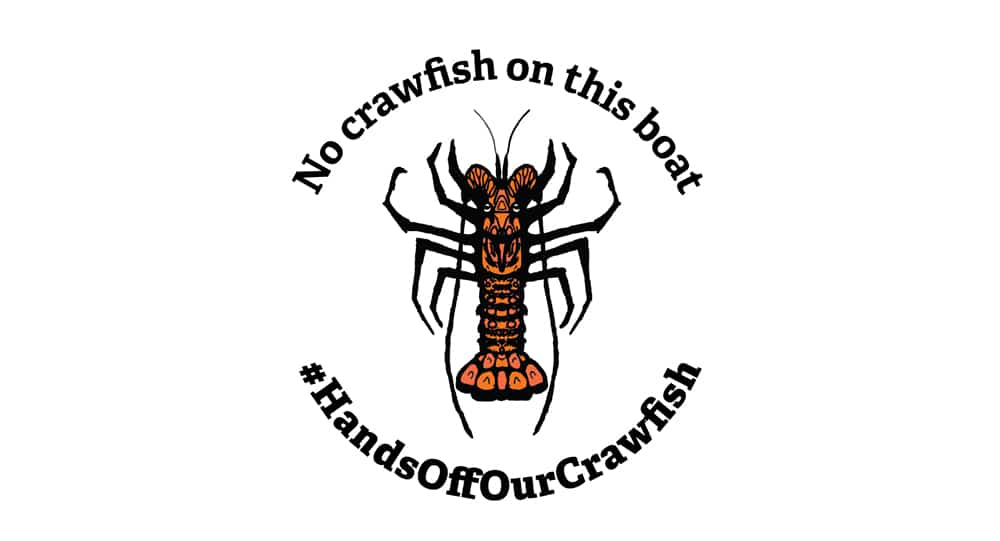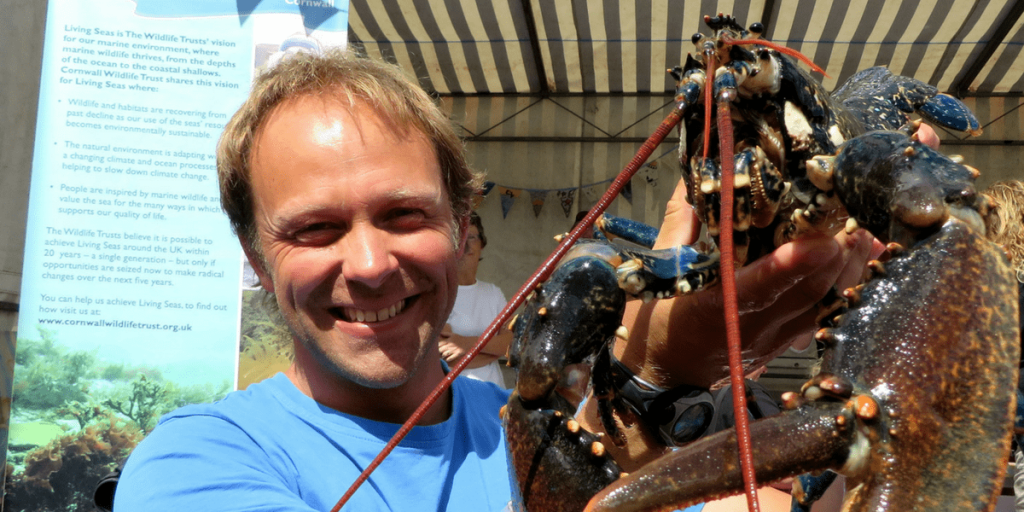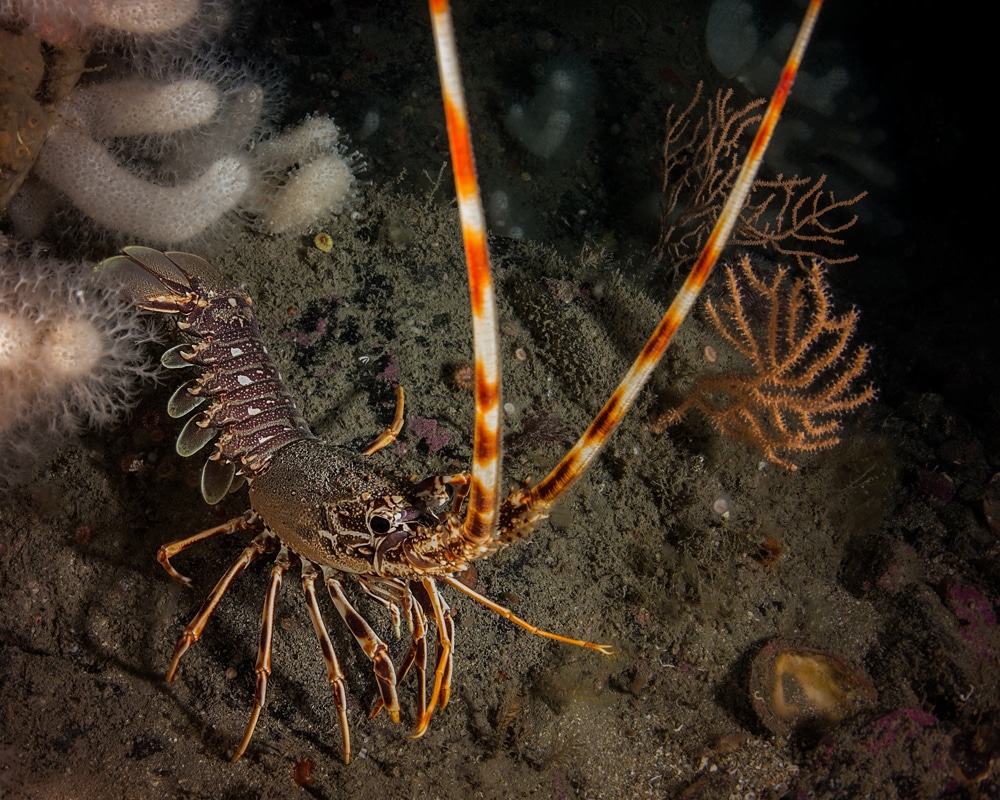Marine Life & Conservation
Divers asked to look after Cornwall’s Crawfish after dramatic comeback

A Cornwall Wildlife Trust initiative introduced by Jeff Goodman
I always thought it was OK to take one for the pot. Diving in the early seventies we hardly ever climbed out of the water without something for our tea. But as the eighties approached I saw less and less marine life as full ‘goody’ bags from divers got bigger and more frequent. I started to feel uneasy about what we were doing to our seas.
Of course commercial fishing and angling have always taken an horrendous toll on marine life but now we as divers were in a position to find and take what was left. There is no finer example to this than the wonderful Crawfish. Along with them the Lobsters and Scallops were equally depleted. Scallops reproduce far quicker than Crawfish and so had a better chance to recover. Lobsters were and are reintroduced by hatcheries in their hundreds of thousands. The Crawfish was ignored and left to simply vanish from the marine ecosystem.
Finally against all the odds, Crawfish are starting to re-appear in Cornish waters and already fishermen and divers are eager to take them.
I spoke with Matt Slater, Marine Awareness Officer for Cornwall Wildlife Trust and as a result he sent me the following article on their new initiative to give these incredible animals a fighting chance. Whether you live in Cornwall or Timbuktu, I urge, no implore you to read this and give it all the support you can.
Matt Slater:
After nearly forty years crawfish have made a dramatic comeback as large numbers of young crawfish have reappeared on wrecks and reefs all around the Cornish shores.
The crawfish or spiny lobster is a spiky and ornate relative of the common lobster, with incredible long antennae and a powerful finned tail. This species was overfished back in the 1970’s and 80’s by both fishermen and divers but in recent years marine conservationists have been thrilled to see their return.
However Cornwall Wildlife Trust is now calling on divers to show that they care about crawfish by pledging not to catch them through a new national campaign called #HandsOffOurCrawfish
They hope through education to get a high proportion of divers supporting this campaign with the eventual aim to see crawfish better protected in our waters, ensuring a sustainable fishery for the species. Dive schools, dive boats and dive clubs will be provided with stickers saying ‘no crawfish on this boat’ and the Trust hopes to provide a much needed clear message for the benefit of these creatures.
Crawfish can live to up to 60 years and are very slow growing. They have long antennae which are used to taste the water to help them look for food as they scavenge on the sea bed.
They also communicate by generating a strange creaking sound by rubbing the bases of their antennae against their shell. This sound can travel for long distances and may play a role in attracting mates.
Matt Slater, Marine Awareness officer for Cornwall Wildlife Trust describes his first encounter with these creatures.
“We dropped down to the seabed on a rocky reef off Newquay that I have dived many times over the years. Where previously I had never seen any crawfish, on this dive within just a few minutes we found 18 beautiful crawfish.”
“Through our Seasearch citizen science project our volunteer divers have recorded huge numbers of crawfish over the past few years in Cornish waters. And we now carry out repeat survey dives for this species at several locations in Cornwall.”
“Divers all around the south west are reporting crawfish at their favourite dive sites and everyone is really pleased to see them back. However, there is a strong concern from many that we must ensure that they are back for good and that fisheries for this species are carried out at sustainable levels to ensure that history does not repeat itself and they become over fished again.”
“The majority of recreational divers appreciate all the marine creatures they encounter and very few collect marine life to eat, preferring to enjoy peaceful encounters and underwater photography. Having said this, many popular dive sites appear to have groups of resident crawfish. If even small numbers of divers start collecting them, it would not take long for them to disappear once again.”
“We already have the support of many of Cornwall’s dive operators and dive schools but we would ask everyone to get involved and to pledge not to take crawfish on their dives – that’s why we started the ‘Hands Off Our Crawfish’ campaign.”
Dive Newquay were the first company to sign up to the campaign. Paddy Maher of Dive Newquay says, “Since we first set up our dive company five years ago we have always made our customers return any collected crawfish back into the sea. No one wants to see these creatures wiped out again as they were in the 1980’s. It makes absolute sense to educate divers and to ask people to think more about their impacts on the underwater world.”
To pledge please visit www.cornwallwildlifetrust.org.uk/crawfishproject Look out for the hash tag #HandsOffOurCrawfish on social media as the Trust hopes divers will share their photos and crawfish news to help spread the word about the project!
This campaign will also be promoted through the national Seasearch programme in Devon, Dorset and the Channel Islands.
Further information
Crawfish or spiny lobster
Palinurus elephas
- These ancient crustaceans are usually found on exposed rocky reefs at depths of at least fifteen meters.
- They are heavily armoured, with sharp spines for defence.
- Unlike lobsters crawfish don’t have large claws instead having spikey front legs.
- Crawfish grow slowly, and can grow to a maximum size of 1 meter living for at least 60 years.
- They take at least three years before they are old enough to breed. Larger females produce far more eggs than smaller ones.
- Crawfish use their spectacular, long antennae to taste tiny amounts of chemicals in water allowing them to detect predators and other mates as well as food.
- Crawfish can communicate using strange creaking sounds that they produce by rubbing the base of their long antennae against each other. This sound can travel for long distances underwater. Some Cornish fishermen actually call crawfish ‘creakers’
Seasearch
- Seasearch is a national citizen science project that trains recreational divers to record marine life and habitats they encounter on their dives.
- The project is led by the Marine Conservation Society and in Cornwall it is coordinated by and funded by Cornwall Wildlife Trust.
Aims of Seasearch
- To encourage the participation of volunteer recreational divers in marine conservation through gathering data, particularly for areas where little data exists or where there is a conservation need,
- To provide training in recording skills to enable volunteer recreational divers to participate in Seasearch,
- To make quality assured Seasearch data available to partner organisations and the general public,
- To raise public awareness of the diversity of marine life and habitats in Britain and Ireland through the dissemination of information gathered and the identification of issues arising from it.
Matt Slater, Marine Awareness Officer CWT

A Cornish Marine biologist and educator, experienced in aquarium and community engagement work. I am passionate about our marine world and love sharing this passion and encouraging us all to take better care for the oceans.
Marine Life & Conservation
Double Bubble for Basking Sharks

 The Shark Trust is excited to announce that, for two more days only, all donations, large or small, will be doubled in the Big Give Green Match Fund!
The Shark Trust is excited to announce that, for two more days only, all donations, large or small, will be doubled in the Big Give Green Match Fund!
Donate to Basking in Nature: Sighting Giants
The Shark Trust is hoping to raise £10k which will be doubled to £20k. This will go towards Basking in Nature: Sighting Giants. And they need YOUR help to reach they’re goal.
The Shark Trust’s citizen science project is to monitor and assess basking sharks through sightings; encouraging data collection, community engagement, and promoting nature accessibility. This initiative aims to enhance health and wellbeing by fostering a deeper connection with British Sharks.
Campaign Aims
- Increase citizen science reporting of Basking Sharks and other shark sightings to help inform shark and ray conservation.
- Provide educational talks about the diverse range of sharks and rays in British waters and accessible identification guides!
- Create engaging and fun information panels on how to ID the amazing sharks and rays we have on our doorstep! These can be used on coastal paths around the Southwest. With activities and information on how you can make a difference for sharks and rays!
- Promote mental wellbeing through increasing time in nature and discovering the wonders beneath the waves!
Donate, and double your impact. Click Here
Marine Life & Conservation
Leading UK-based shark conservation charity, the Shark Trust, is delighted to announce tour operator Diverse Travel as a Corporate Patron

 Corporate Patrons provide a valuable boost to the work of The Shark Trust. The Trust team works globally to safeguard the future of sharks, and their close cousins, the skates and rays, engaging with a global network of scientists, policymakers, conservation professionals, businesses and supporters to further shark conservation.
Corporate Patrons provide a valuable boost to the work of The Shark Trust. The Trust team works globally to safeguard the future of sharks, and their close cousins, the skates and rays, engaging with a global network of scientists, policymakers, conservation professionals, businesses and supporters to further shark conservation.
Specialist tour operator Diverse Travel has operated since 2014 and is committed to offering its guests high quality, sustainable scuba diving holidays worldwide. Working together with the Shark Trust will enable both organisations to widen engagement and encourage divers and snorkellers to actively get involved in shark conservation.
“Sharks are truly at the heart of every diver and at Diverse Travel, we absolutely share that passion. There is nothing like seeing a shark in the wild – it’s a moment that stays with you forever!” says Holly Bredin, Sales & Marketing Manager, Diverse Travel.
“We’re delighted to celebrate our 10th year of business by becoming a Corporate Patron of the Shark Trust. This is an exciting partnership for Diverse and our guests. We will be donating on behalf of every person who books a holiday with us to contribute towards their vital shark conservation initiatives around the world. We will also be working together with the Trust to inspire divers, snorkellers and other travellers to take an active role – at home and abroad – in citizen science projects and other activities.”
Paul Cox, CEO of The Shark Trust, said:
“It’s an exciting partnership and we’re thrilled to be working with Diverse Travel to enable more divers and travellers to get involved with sharks and shark conservation. Sharks face considerable conservation challenges but, through collaboration and collective action, we can secure a brighter future for sharks and their ocean home. This new partnership takes us one more valuable step towards that goal.”
For more information about the Shark Trust visit their website here.
For more about Diverse Travel click here.
-

 News3 months ago
News3 months agoHone your underwater photography skills with Alphamarine Photography at Red Sea Diving Safari in March
-

 News3 months ago
News3 months agoCapturing Critters in Lembeh Underwater Photography Workshop 2024: Event Roundup
-

 Marine Life & Conservation Blogs3 months ago
Marine Life & Conservation Blogs3 months agoCreature Feature: Swell Sharks
-

 Blogs2 months ago
Blogs2 months agoMurex Resorts: Passport to Paradise!
-

 Blogs2 months ago
Blogs2 months agoDiver Discovering Whale Skeletons Beneath Ice Judged World’s Best Underwater Photograph
-

 Gear Reviews2 weeks ago
Gear Reviews2 weeks agoGEAR REVIEW – Revolutionising Diving Comfort: The Sharkskin T2 Chillproof Suit
-

 Marine Life & Conservation2 months ago
Marine Life & Conservation2 months agoSave the Manatee Club launches brand new webcams at Silver Springs State Park, Florida
-

 Gear Reviews3 months ago
Gear Reviews3 months agoGear Review: Oceanic+ Dive Housing for iPhone




















